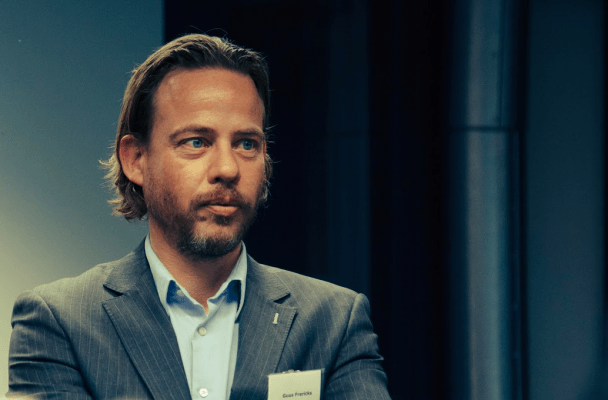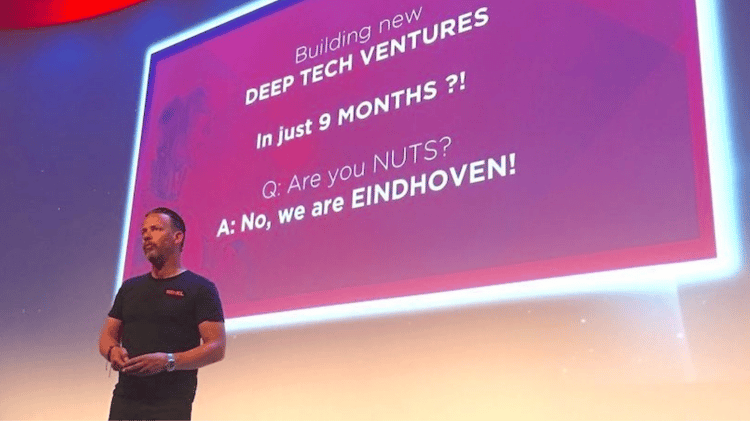


Serial entrepreneur and investor Guus Frericks, founder of HighTechXL, describes himself as a "Philips product”: "My parents worked for Philips for decades. I grew up here in the region, listening to their stories over dinner. So I guess I developed a fascination for technology very early on." That interest went hand in hand with his entrepreneurial view of the world: "It must have been very annoying for my parents because I was constantly observing the environment around me and thinking about ways of improving everything."
A huge supporter of the Fe+male Tech Heroes Network, Guus is always present at our mentor sessions, talking about his entrepreneurial experience and advising newcomers. For him, entrepreneurship is a lifestyle - something that affects one's family, friends, habits, and all aspects of life. As such, it shouldn't be romanticized but perceived as a wonderfully energetic and transformative experience: "It's an adventure. It makes you feel ultra-alive."
You have quite an extraordinary working journey…
I did a master's graduation assignment at Philips Semiconductors in Nijmegen. I planned to graduate, travel the world for a year or two, and then look for a job. However, Philips decided to implement my recommendations and offered me a position as an industrial engineer. I decided to postpone my traveling plans for a little while, trading them for earning some money and experience. Within a few months, though, a management position became vacant, and they asked me to run a unit with 90 engineers. I was the youngest in the department. I eventually became a vice president at Phillips in my early 30s. My dad was super proud. As I became part of the leadership team, we founded NXP Semiconductors.
Although I was learning a lot, I wanted to do more. The higher you rank in these corporates, the more internal reporting you have to do, and I just wasn't happy anymore. I've never been interested in the money side of things. For me, money is always the natural result of doing remarkable things consistently. I concluded I had not been built for this corporate career.
And how did that go?
They couldn't believe I wanted to leave NXP: I had a management Equity Plan, and we were going to the stock exchange. But that was not enough for me. So when they set up a joint venture with Sony to create the world's first integrated contactless payment standard, I became that initiative's CEO. That was more entrepreneurial; they gave me a starting capital of 30 million and a key for our headquarters in Vienna, still to be inaugurated. So I built a team, integrated the technology, and we were done with that project in 2010.
My kids were born abroad. So my wife and I decided to go back to the Netherlands to be closer to our families. And that is when I started to really follow my heart and do what I love: help young tech entrepreneurs build a business by investing my own money and helping get their businesses off the ground.
How did HighTechXL come to be?
There's so much knowledge and network in the Eindhoven area. I thought about mobilizing that collective knowledge to help young tech companies develop their ideas. Initially, I called it the Startup Factory Eindhoven. I presented the concept to Phillips, High Tech Campus Eindhoven, and my entrepreneurial friends. Before I knew it, HighTechXL was a reality.
Every day, I'm surrounded by brilliant folks who share the same mission and values. If we combine entrepreneurship with technology, we can address the grand challenges societies face today. I supported hundreds of R&D projects in the last decade. Whether it's health care, energy transition, food shortages, etc., all of these significant challenges can be fixed through entrepreneurship and technology. Working with highly motivated and clever people on solutions to make the planet a better place is something that really excites me.

Would you highlight a challenging moment in your career as an entrepreneur?
Being an entrepreneur is challenging in itself. People always tend to look at successes, focusing on the materialistic side. But they forget that to get there, you need to do extremely tough and arduous things. I've been overly concerned many times, having no idea how to pay for my employees' salaries. Or imagine the company where you invest all your money in is about to go bankrupt because you can't raise new capital. Those are dilemmas we, as entrepreneurs, face throughout our careers.
Recently, a Dutch female ice skater won the Tokyo Winter Olympic Games gold medal. It's the fifth time she's done it. But that lady is training night and day. She put in a lot of blood, sweat, and tears, and, eventually, she got a gold medal. It's the same with being an entrepreneur: you need to give your all, and maybe you'll be successful because, let's face it, 95% of startups fail. So the mental resilience you need to make it up is enormous. Yes, being an entrepreneur is fun, but it's not for everybody. One day, I'll get to write a book about it.
What does the word "diversity" mean to you, and how does that impact your work?
I'm a big fan of diversity. For me, it is all about different perspectives, which come from distinct characters. It's when you have a team with senior and very young people mixed in it or different cultural backgrounds. And, obviously, it encompasses men, women, etc. You just need to find a balance on all those elements. I see diversity as a business asset. I believe that truly diverse teams get more perspectives on the table and make better decisions, which leads to success. At HighTechXL, we have many nationalities and a 50/50 guys-girls ratio. Moreover, the last time I checked, about 80% of the leadership roles were filled by females.
In the Sustainable Campus docu series, you talk fondly about "sustainability" and how that aspect is crucial for companies who want to join a program at HighTechXL. How did you come up with that criteria?
Well, I guess it started from within. If I work on something, I want that to have a purpose. If you're not working hard, every single day, to try to improve the lives of others - according to my values - you're wasting your time. There's also the sense of urgency, of course: we can no longer deny we must do something concrete about the energy transition and scarcity of foods. During the pandemic, it became evident how many people on the planet were still not connected to the internet. Many children worldwide couldn't attend online schooling. It makes sense to work on real problems and for the greater good.
I've also learned that many like-minded people will follow your example if you do that. I see an increasing number of people making bold decisions to quit their safe job, where there's a lack of obvious purpose, to move to another environment where they can make more impact.
You can find the interview with Guus on 6 minutes 54.
What are some critical aspects of establishing and maintaining a breeding ground for innovation?
First and foremost, keep innovating. As a region, we have unique strengths, and we must put those to good use. The pandemic has shown us the urgency to bring high-speed internet to everybody on the planet to fight inequality. And that can be done in this region. As an example, Aircision can apply light to beam data up to 10 gigabits per second over multiple kilometers as an alternative to glass fiber. This is utterly relevant because it is a costly and longstanding exercise to connect households with fiber. We need to continue to play with our strengths and develop outstanding, fast-growing companies that address the current challenges societies face today.
Do you have some good tips for aspiring entrepreneurs?
The best tip is to follow your heart. Too many people are acting from fear, believing they need the safety of a salary. From my perspective, if you embrace the notion of freedom and follow your heart, knowing you're devoting your scarce time to something that makes you happy, you'll be fine. You'll figure it out. It won't be easy, no. But nothing is easy in life.
If you asked me, "What is happiness?" I would define it as waking up in the morning and being excited about what you're going to do. Not being overly concerned about past mistakes, neither what the future will bring because you can't determine the future— just being happy at the moment. And you can only do that if you follow your heart. For some people, this joy comes from creating a tech company; for others, it is to have regular jobs. It doesn't matter which one you choose, as long as you're happy with your choice.